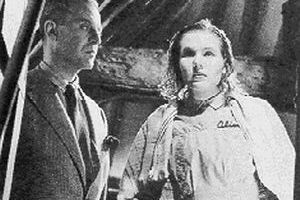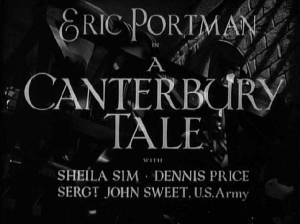|
Each For Their Own Reason

A Canterbury Tale became Powell and Pressburger's first critical and box office failure. Perhaps Powell's most personal
and misunderstood film, set in and around his beloved Canterbury where Pressburger, as a Hungarian with a stateless passport,
was denied permission to work. At the heart of the film lies a deep love of England, its heritage and its future. The mystical
quality and poetic vision of the film is only now being fully recognised, but in 1944 there were few willing to accept a fanatical
poet figure expounding his philosophy on life. Casting included Esmond Knight in three roles: first as Narrator, speaking
from Chaucer's Canterbury Tales, and later in two small comic roles - one a British soldier comparing notes with Bob Johnson,
and the other in a hilarious scene as a Village Idiot. Of the leading players, apart from Eric Portman in a role refused by
Roger Livesey who evidently considered the part distasteful, the remaining three performers were all making their screen debuts:
Sheila Sim inherited the role of Alison the Land Girl intended for Deborah Kerr, now under contract to MGM. Dennis Price was
to become a popular ingredient in many British productions of the next 30 years, while for the story's American soldier, Powell
discovered non-professional actor John Sweet, a US Army Sergeant, appearing in a touring production of Our Town. The surprise
hit of the picture, John Sweet gained excellent reviews; this was to be his only screen appearance and he returned to teaching
in America after the war.
Three train passengers arrive during a black-out at Chillingbourne in Kent and, as they make
their way through the village, Alison Smith has something poured on to her hair by an unseen attacker. At the town hall they
learn that she is the eleventh victim of the mysterious 'glueman'. Magistrate Thomas Colpepper arranges for Bob Johnson -
an American soldier who had intended to get out at Canterbury - to stay at a local guest house and hopes that he will stay
to see more of the country, although Bob is anxious to move on. Alison, Bob and Peter Gibbs attend Colpepper's lecture next
day on the history of the Pilgrims Way and the surrounding area. Moved by the talk, Alison later revisits the scene of a pre-war
caravanning holiday spent with her fiancé, now missing in action. There she meets Colpepper, who finds that she too has a
love of the countryside, though for different reasons. Unseen, they overhear Bob and Peter discussing their lives before the
war and their suspicions of the 'glueman's' identity.
On the train next morning, Colpepper admits that he is the glueman, but claims his intention was to drive girls to his
lectures where they might learn the importance of their national heritage instead of going out with GI's while their sweethearts
are away. Peter determines to report him on their arrival, but Colpepper insists that he will receive his own judgement. At
Canterbury Bob hears that his girl has enlisted in the WACs and receives several letters telling him all is well. Alison visits
the blacksmith where her caravan is stored and learns that her fiancé has been found alive in Gibraltar, while Peter - a classical
music student who was forced to take work in peace time as a cinema organist - realises his ambition to play the organ inside
Canterbury Cathedral during a service for the departing troops. All have received their blessings save Colpepper, who must
serve his penance alone.
Eric Portman (Thomas Colpeper, JP)
Sheila Sim (Alison Smith)
Dennis Price (Peter Gibbs)
Sgt John Sweet (Bob
Johnson)
Charles Hawtrey (Thomas Duckett)
Directors: Michael Powell, Emeric Pressburger
Producers: Michael Powell, Emeric Pressburger
Screenplay:
Michael Powell, Emeric Pressburger
Director of Photography: Erwin Hillier
Editor: John Seabourne
Music: Allan
Gray
Production Company: The Archers Film Productions
Running Time: 124 minutes
note: the running time was cut down to 95 minutes
for U.S release, but included some scenes that were
not in the original.
|
 |
|
 |
 |
|

the webpages at screenonline
at the British Film Institute
massive thanks go out to
Neil Murray for these.
they can be found on a
website about the work of
Powell and Pressburger,
run by Steve Crook.
it's a labour of love, and
it shows. Thanks Steve!
|
|
related internet links
|
|
a visit to the locations used in
A Canterbury Tale

|
|
 |
 |
![A Canterbury Tale 1944 [vhs format]](sitebuildercontent/sitebuilderpictures/acanterburytalevhs.jpg)
|
| also available in DVD format |
slightly different versions of this page
|
 |
|
|
 |
|
|
|

